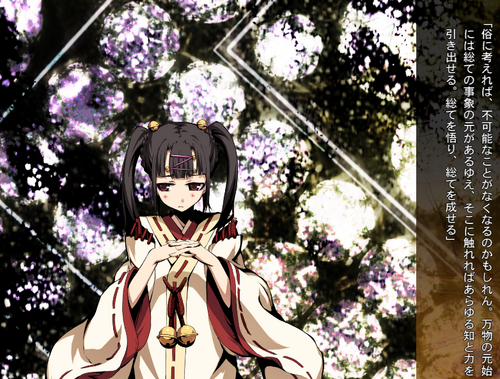
Hadou Gods become the origin from which all phenomenon and concepts come from
Summary
Conceptual Manipulation is the ability to manipulate, create, and/or destroy abstractions such as concepts, ideas and archetypes. This ability involves the manipulation of universal abstractions, and not the universe directly, giving it a wide variety of applications, ranging from not combat applicable to incredibly dominating, being able to change the universe's fundamental principles on the most primal level. As each concept is linked with its respective "object", altering the concept will change every object in the same way the concept itself was changed, effectively altering all of reality.
Possible Uses
- Concept Creation: The ability to create concepts. By using this ability, destroyed concepts can be restored or new ones created, giving the user the ability to create fundamental principles that govern reality and the world around them. With this power, one can create the a concept that is unfathomable to the current mind, changing the world to match this new conceptual universal.
- Concept Alteration: The ability to manipulate, alter, or change concepts. By using this ability, concepts themselves can be changed in a variety of ways. The concept can have have an object added to it, an object taken from it, or change the current principle of the concept. If a concept is changed, the world is altered in some way to fit this new conceptual definition, though the extent of this varies by the type of concept being manipulated.
- Concept Destruction: The ability to destroy or remove a concept. By using the ability concepts are removed from reality. This can be wide-spread or very targeted, either erased the concept of an overarching fundamental principle, such as space, or an individual. When destroyed at this level, nothing can be restored without using similarly powerful conceptual creation. Conventional regeneration or resurrection, no matter how powerful, would prove impossible as the very abstract concept of the character would not exist.
Types
Type 4: Dependent
Such concepts are abstract and govern conventional reality. These concepts shape everything that physically exists and changing them would require either the the manipulation of all objects relating to it's respective concept, or changing all objects of the concept along with the concept itself. Due to their nature being directly linked to conventional reality, the concept of dimensions/space-time at this scale would be equal to the amount of spatiotemporal dimensions known to exist in-verse.
Examples: Every character who is said to manipulate, but the qualities of the concepts they affect aren't elaborated upon.
Type 3: Independent
Such concepts are outside of conventional reality. Due to not being directly linked to conventional reality, these can exist even if the objects for the concepts they affect don't do so, acting independently from said existences. Due to their nature not being bound to conventional reality, but still not existing above it, the concept of dimensions/space-time at this scale would be equal to the amount of spatiotemporal dimensions known to exist in-verse.
Examples: Anos Voldigoad (Maou Gakuin no Futekigousha), Rimuru Tempest (Web Novel) (Tensei Shittara Slime Datta Ken), Original Spirit (Pokémon)
Type 2: Jungian
Such concepts are archetypal pre-conceptions of conventional reality. These archetypes exist without their objects outside of the physical reality, and influence human perception, shaping their thoughts, experiences and reason, being the underlying things behind humanity's actions. These archetypes must exist prior to and after the existence of any object of the concept, such as destroying every door not altering the concept of "door", as these archetypes had existed before the object of "door" was conceived.
- Jungian Concepts, despite being considered a different type from Platonic Concepts, are treated as operating on the same scale per this revision, albeit when the standards for what qualifies as a "Jungian Archetype" are met within the respective setting.
Examples: Observation users (Megami Tensei), NiGHTS (NiGHTS)
Type 1: Platonic
Such archetypes are completely transcendental to reality in its all conceptions. These archetypes shape all of reality around them and on whatever level of existence they are present in, with everything "participating" in them as mere "objects" to the true "essence", being unchaged by anything. They will be able to alter every object relating to that concept on whatever plane of reality they exist in, regardless of whatever said objects physically exist. These archetypes possess the qualities described by the theory of forms, being completely beyond all spatial and temporal dimensional constructs regardless of scale. Due to their absolute transcendental nature, most works of fiction do not portray platonic concepts as they should/naturally are, leaving rooms for inconsistencies and consequently inflation of extremely high statistics for several verses through vague statements, plus authors mostly not knowing how those concepts truly works in nature. As such, platonic concepts should only be considered as Type 1 if they are shown/stated to truly follow the theory of forms for the most part, which, in addition to the already stated requirements from the Type 3 description, would include (However, if the concept is straight up stated to be platonic, then only another one of the requirements is needed.):
- Being aspatial and atemporal.
- Impossible to recognize/perceive from the physical world.
- The objects being a mere mimic/imperfect manifestation compared to the actual Form.
- Being unchangeable/immutable.
Examples: Yakagi Suimei (Isekai Mahou wa Okureteru!), New Gods (DC Comics), Abstract Entities (Marvel Comics)
Non Qualifying
Concepts that are not abstract or universal, such as those outlined in idealism and nominalism, do not qualify for Conceptual Manipulation of any Type, as these are purely mental ideas with no influence on the physical world, making affecting such concepts more in line with Mind Manipulation and/or Perception Manipulation. For a character to qualify for Conceptual Manipulation, they must be able to manipulate abstract and universal concepts that have direct influence on the physical world. Indirect manipulation of concepts, such as the universal changing of the object, does not qualify as Conceptual Manipulation. The use of social influence or any non-supernatural power to achieve an alteration of a concept does not qualify as Conceptual Manipulation, as this is not a direct manipulation of the concept, but rather of its perception.
Limitations
- All Conceptual Manipulation Users are bound by the object of the concepts they have been shown to manipulate. A character able to manipulate the concept of darkness is not able to manipulate the concept of matter or an individual unless otherwise shown.
- All Conceptual Manipulation Users are bound by the application of the object of the concepts they have been shown to manipulate. A character able to manipulate the concept of light cannot use this conceptual manipulation to increase the potency of their Mind Manipulation, for example. Similarly, concepts that have not shown weaponization of some sort cannot be used offensively.
- All Conceptual Manipulation Users are bound by the use of the power. A character who embodies a concept cannot create, manipulate, or destroy it unless otherwise shown. A character who can create a concept cannot destroy it unless otherwise shown, and vice versa.
- All Conceptual Manipulation Users are bound by the Type of concept they have been shown to manipulate. A character able to manipulate a concept on a Type 4 level cannot manipulate any other concept Type.
